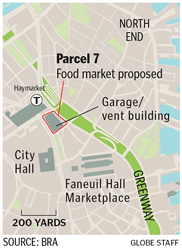State pledges money for Greenway location
Boston is finally slated to get its own downtown public food market — a showcase for dozens of New England agricultural businesses that will sell locally grown produce, artisan cheeses, seafood, and meats.
Prospects for the market, the kind of tourist-friendly amenity long established in other major cities, jelled after the Patrick administration pledged yesterday to spend up to $10 million to prepare a state-owned location on the Rose Fitzgerald Kennedy Greenway.
Having recently rejected proposals from other developers, Patrick aides threw their support behind the nonprofit Boston Public Market Association, which is promising to make the market a window on the region’s farming heritage and burgeoning food culture. The market association will model the Boston facility after the Ferry Building Marketplace in San Francisco and Reading Terminal in Philadelphia, and expect it to be as popular a tourist attraction as those two markets.
Although the timetable remains fluid, the market is expected to open in a year to 18 months.
The administration’s backing was enthusiastically welcomed by Mayor Thomas M. Me nino, who heavily lobbied state officials to support the nonprofit group and its effort to enliven a long-vacant building along the Greenway.
“We’ve had a lot of delays, but now the governor is moving forward and saying ‘enough is enough,’ ’’ Menino said. “This is going to create vitality on that property and give local farmers an opportunity to sell their wares in an urban location.’’
Patrick and Menino aides said they will spend the next few months devising the financial structure and physical layout of the market, which will require extensive plumbing, cold storage, and other utilities. The site is the ground floor of an office building and parking garage at the Haymarket transit station, on the corner of Hanover and Blackstone streets.
Talk of a downtown food market has gone on for years, with a series of false starts and debate over where to put it. But within the last year developments set the stage for a breakthrough.
The first was a 2009 study by the city that zeroed in on a location for the market. The study recommended a food market district be formed around the existing weekend produce and fish vendors on Blackstone Street, an ideal location for the market because of its proximity to the Greenway and other tourist destinations, such as Faneuil Hall.
More recently, Menino implored state officials to back the public market association and provide the money necessary to get it off the ground.
The association has many members with deep experience in either the food business, politics, or real estate development. Donald Wiest, its president, is a real estate lawyer who previously worked for the Boston Redevelopment Authority. Other members include Howard Leibowitz, a former top City Hall aide, as well as several prominent farming advocates and former state agricultural officials.
The lack of a central market has long been a black mark on the city’s food scene. The last traditional market closed in the 1950s, when buildings in Faneuil Hall Marketplace fell so deeply into disrepair that the federal government threatened to close them, forcing most of the vendors to leave.
For decades, Boston remained one of the few major American cities without a venue to showcase its local foods and agricultural products. Seattle has Pike Place; Baltimore has Lexington Market; Cleveland has the West Side Market. Even Portland, Maine, has a standing public food market.
“It has not been simple or easy, but we’re thrilled to be moving forward,’’ said Wiest. “This will showcase the extraordinary quality of food produced throughout New England and bring north of 5 million people a year through this location.’’
Some local food producers said the market will provide a significant economic boost by giving them direct access to customers, instead of selling to wholesalers or local restaurants.
“Today, we can only get to customers directly through our website or through our place in Duxbury,’’ said Chris Sherman of Island Creek Oysters. “This is a great way to grow the retail side of the business.’’
For many local farms, access to a reliable customer base is a make-or-break issue. Massachusetts farms rely heavily on local markets and farm stands because of the lack of major agricultural distributors in the state. For most, profit margins are razor thin.
The market is slated to go into a five-story building that was built earlier this decade but, except for the parking garage, was never occupied. Its Greenway location will give the Boston market high visibility, and allow sellers to tap into a steady stream of foot traffic.
Some funding issues still need to be worked out. For example, the $10 million in state funds will be allocated over time, with only about $4 million likely to be released in the near term. Given the $7 million it will cost to open, the public market association will have to raise millions, from either private sources or government grants, to start construction. Wiest said he believes the state’s commitment will help the association raise the needed funds. “It’s a gap we think is closeable,’’ he said.
Already, the market association has gained public support from top Boston chefs, including Todd English and Barbara Lynch, who appear on the group’s website. Patrick aides also pledged to assist with the financial plan and to try for funding from the US Department of Agriculture.
While the administration is committed to the market on the ground floor, it still must attract tenants for the upper floors of the building. The state Department of Transportation is planning a series of public meetings to discuss uses for that space, as well as development of an adjacent parcel along Blackstone Street.
Casey Ross Boston Globe July 29, 2010

No comments:
Post a Comment